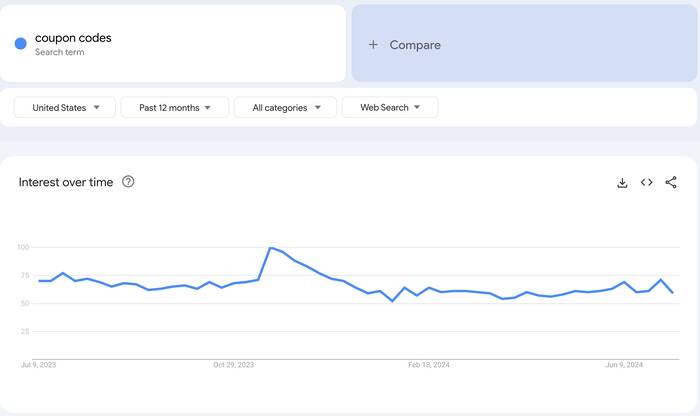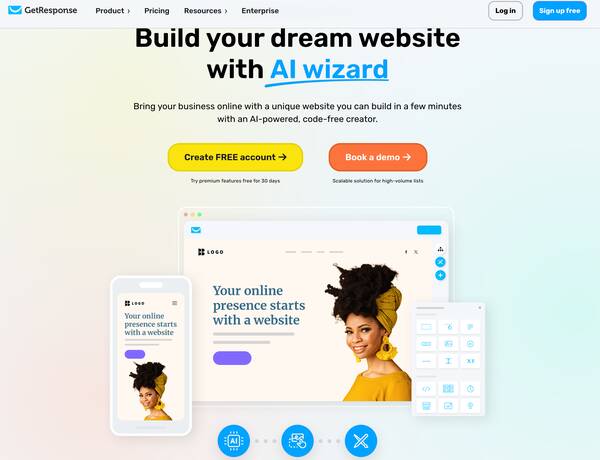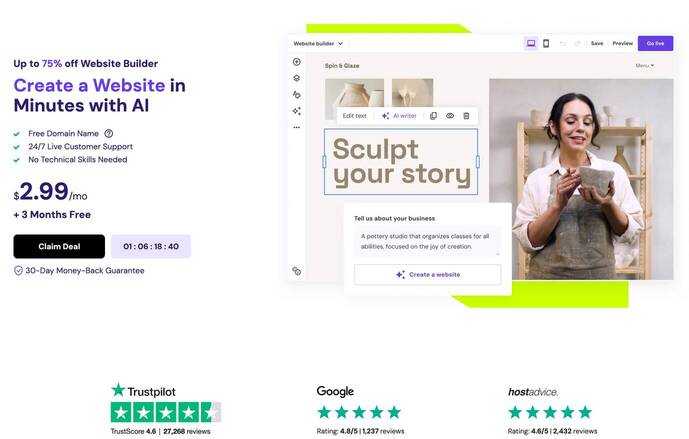Starting as an affiliate marketer with no experience can seem daunting, but it’s possible to build a successful affiliate marketing business with the right steps.
What is affiliate marketing and how it works
Affiliate marketing is a performance-based strategy where businesses reward affiliates for driving traffic or sales to their products.
It uses a network (e.g. ShareASale, Impact) to connect three parties:
- advertiser
- affiliate
- consumer.
The advertiser provides the product and sets up an affiliate program, often through an affiliate network. Affiliates promote the products via websites, blogs, social media, or email campaigns using unique affiliate links. When consumers click these links and make a purchase or complete an action, the affiliate earns a commission.
A common example is Amazon’s Affiliate Program. Amazon allows individuals and businesses to sign up as affiliates and earn commissions by promoting its products. Affiliates might write reviews, create tutorial videos, or curate recommended product lists, embedding their unique affiliate links in the content.
When visitors click these links and buy something from Amazon, the affiliate earns a percentage of the sale. This helps Amazon reach a wider audience and allows affiliates to monetize their content.
Video Tutorial: How to start affiliate marketing with no money in 2024
Here’s a step-by-step guide to help you get started:
9 Steps to Become a Successful Affiliate Marketer
1. Choose a Niche
In affiliate marketing, a niche is a specific segment of a broader market that caters to a particular interest, need, or problem.
For example, within the broader market of health and wellness, niches might include yoga for seniors, vegan nutrition, or mental health for teenagers. Focusing on a niche allows marketers to tailor their content and marketing efforts to a well-defined audience, increasing the likelihood of engagement and conversions.
Another good example of a niche is “coupon codes.” Use Google Trends to analyze this niche, you will find It has been enduring for at least the past 12 months or more.

Niches can be defined by various factors, including demographic characteristics (age, gender, income level), psychographic characteristics (lifestyle, interests, values), and specific needs or problems that the target audience faces. The more specific and focused your niche, the easier it is to position yourself as an expert and build a loyal audience.
- Interest and Passion: Select a niche that you are interested in and passionate about, as this will make content creation more enjoyable.
- Research Demand: Use tools like Google Trends, Keyword Planner, and niche forums to understand the demand and competition in your chosen niche.
Learn More: 9 best niches for affiliate marketing & how to choose yours
2. Join Affiliate Programs
An affiliate program is a marketing arrangement where a business rewards affiliates (individuals or other businesses) for bringing in customers or driving sales through the affiliate’s promotional efforts. Affiliates use unique links (This kind of link is called an affiliate link.) to track their referrals, earning commissions based on the traffic or sales they generate.
Features of an affiliate program:
- Commission Structure: Affiliates earn a percentage of sales or a fixed amount for each referral, providing financial incentives for effective promotion.
- Tracking and Reporting: Unique affiliate links and detailed analytics track affiliates’ performance, ensuring accurate and transparent commission payouts.
- Promotional Tools: Affiliates receive marketing materials such as banners, ads, and product links to assist in their promotional efforts.
- Support and Training: Many programs offer resources, tutorials, and support to help affiliates maximize their marketing effectiveness and success.
As a newcomer, you should look for beginner-friendly affiliate programs like Amazon Associates, ClickBank, ShareASale, and CJ Affiliate.
Note: Apply to join affiliate programs. Some may have an easy sign-up process, while others might require an approval process.
3. Build a Website
Building a website for affiliate marketing is a strategic move for anyone looking to generate passive income through online channels.
Building a website involves several key steps, starting with buying a domain name. Next, choose a reliable web hosting provider to store your website files and make them accessible online.
- Domain name registrars
- NameCheap
- Godaddy
- Hosting Provider and Plans for Beginner
Once the domain and hosting are set up, you need to choose a website-building platform. There are two common ones: Website Builder and WordPress.
Website Builder
A website builder is a tool that helps you create your website without coding and experience. It provides starter templates and drag-and-drop features to make building a website as easy as possible.
Getresponse AI Website Builder

GetResponse’s AI-powered website builder allows you to create a professional website without any coding knowledge.
By answering a few simple questions about your business and design preferences, AI technology generates a personalized website in just minutes, which you can then customize using the drag-and-drop editor.
Hostinger Website Builder

Hostinger Website Builder is a terrific tool for creating personal blogs, professional sites, and online stores without special technical skills. The core of the process is choosing a template and customizing it until you like it. Thanks to Hostinger’s easy-to-use editor this will be an easygoing experience.
Moreover, Hostinger WordPress AI Assistant can help you create content automatically.
However, there’s a shortcoming – once you choose a template, you can’t switch it without starting all over, and doing this more than once can become annoying quickly.
Learn More: Website Builder vs WordPress: Choosing the Right Platform for You
4. Join Affiliate Programs
An affiliate program is a marketing arrangement where a business rewards affiliates (individuals or other businesses) for bringing in customers or driving sales through the affiliate’s promotional efforts. Affiliates use unique links (This kind of link is called an affiliate link.) to track their referrals, earning commissions based on the traffic or sales they generate.
Features of an affiliate program:
- Commission Structure: Affiliates earn a percentage of sales or a fixed amount for each referral, providing financial incentives for effective promotion.
- Tracking and Reporting: Unique affiliate links and detailed analytics track affiliates’ performance, ensuring accurate and transparent commission payouts.
- Promotional Tools: Affiliates receive marketing materials such as banners, ads, and product links to assist in their promotional efforts.
- Support and Training: Many programs offer resources, tutorials, and support to help affiliates maximize their marketing effectiveness and success.
As a newcomer, you should look for beginner-friendly affiliate programs like Amazon Associates, ClickBank, ShareASale, and CJ Affiliate.
Note: Apply to join affiliate programs. Some may have an easy sign-up process, while others might require an approval process.
5. Choose the right affiliate products
After building an affiliate marketing website and joining the affiliate platform, selecting the right products hinges on understanding your niche and target audience while ensuring product quality and alignment with visitor interests.
Start by defining your niche clearly and researching your audience’s needs. Opt for products that directly address these needs, focusing on high-quality offerings from reputable brands. This approach builds trust and increases the likelihood of conversions, as relevant, reliable products are more appealing to visitors. Additionally, balance high-ticket items, which offer larger payouts, with lower-cost items that may convert more easily for a well-rounded portfolio.
Related: How to find products for affiliate marketing content [for publishers and creators]
Here’s a quick breakdown to guide your selection process:
- Audience-Centric Selection: Focus on products that solve problems or fulfill desires specific to your niche audience.
- Quality and Credibility: Choose products from reputable brands with positive reviews to ensure they meet quality standards.
- Balanced Product Range: Mix high- and low-ticket products, as well as subscription-based options, for a diversified income stream.
Affiliate marketing is a special kind of online business. Although we make money by promoting affiliate products, we should not sell any products on our website, at least to make readers feel that way. We help readers analyze problems or provide suggestions to make money.
Video Training: How You Can Sell Without Selling
6. Create Valuable Content
Creating valuable content on an affiliate marketing website is essential because it builds trust, engages your audience, and enhances your site’s credibility. High-quality, informative content—such as in-depth reviews, comparisons, and how-to guides—provides real value to readers by helping them make informed decisions.
This value-driven approach encourages readers to view your website as a reliable resource rather than a sales pitch, increasing the likelihood that they’ll click your affiliate links and make a purchase. Additionally, valuable content is more likely to rank well in search engines, attracting organic traffic and establishing your site as an authority in your niche over time.
- Content Planning: Develop a content plan that includes topics relevant to your niche. Focus on providing value and solving problems for your audience.
- Content Types: Start with blog posts, product reviews, how-to guides, and listicles. Gradually diversify into videos, podcasts, or infographics if applicable.
- SEO Basics: Learn and implement basic SEO practices to improve your site’s visibility in search engines.
Learn More: Create Valuable Content In 5 Easy Steps
7. Drive Traffic to Your Content
- SEO: Optimize your content for search engines to attract organic traffic.
- Social Media Marketing: Share your content on social media platforms to reach a broader audience.
- Guest Posting: Write guest posts for established blogs in your niche to drive traffic back to your site.
- Email Marketing: Build an email list and send regular newsletters with valuable content and affiliate offers.
Learn More: Proven Strategies to Skyrocket Website Traffic in 2024
8. Track and Optimize
Once you’ve chosen products, assess and optimize their performance continuously to maximize revenue. Use Google Analytics and affiliate dashboards to monitor metrics, refine your product choices, and experiment with different types of content to see what resonates best. Finally, aim to diversify your offerings by adding complementary products that match your niche and cater to varying price points, creating a comprehensive and appealing selection for your audience.
- Use Analytics Tools: Implement tools like Google Analytics to track your website traffic and user behavior.
- Monitor Affiliate Program Reports: Regularly check the performance reports from your affiliate programs to see which products and strategies are working best.
- Adjust Strategies: Use the data to refine and improve your content and marketing strategies continuously.
9. Continue Learning and Networking
- Educate Yourself: Stay updated with the latest trends, tools, and techniques in affiliate marketing through blogs, courses, webinars, and forums.
- Network with Other Affiliates: Join affiliate marketing communities and forums to learn from others, share experiences, and get support.
- Experiment and Scale: Test different strategies, content formats, and marketing techniques. Scale up what works to increase your earnings.
By following these steps and staying committed, you can successfully enter the world of affiliate marketing even without prior experience. Patience, persistence, and a willingness to learn and adapt are key to building a successful affiliate marketing business.
Affiliate Marketing FAQ
1. What is affiliate marketing?
Affiliate marketing is a performance-based marketing strategy where an individual or company (the affiliate) promotes another company’s products or services and earns a commission for every sale, lead, or action generated through their marketing efforts. This is usually tracked through unique affiliate links.
2. How do I get started with affiliate marketing?
- Choose a niche that interests you.
- Research and join affiliate programs relevant to your niche.
- Create content (blog posts, social media posts, videos, etc.) that promotes the affiliate products or services.
- Use unique affiliate links to track your referrals.
- Drive traffic to your content through SEO, social media, email marketing, and other methods.
- Monitor your performance and optimize your strategies.
3. What are the benefits of affiliate marketing for businesses?
Benefits for businesses include:
- Cost-effective marketing: Pay only for actual conversions.
- Expanded reach: Affiliates promote products to their audiences.
- Performance-based: Affiliates are incentivized to generate sales.
- Flexibility: Businesses can scale their affiliate programs as needed.
- Enhanced SEO: Affiliate links and content can improve search engine rankings.
4. What types of affiliate marketing programs are there?
There are several types of affiliate marketing programs, including:
- Pay-Per-Sale (PPS): Affiliates earn a commission for each sale made.
- Pay-Per-Click (PPC): Affiliates earn a commission for each click on their affiliate link.
- Pay-Per-Lead (PPL): Affiliates earn a commission for each lead generated (e.g., sign-ups, form submissions).
- Two-Tier Programs: Affiliates earn commissions for referring other affiliates to the program.
5. How can I increase my earnings from affiliate marketing?
To increase your affiliate marketing earnings:
- Choose high-quality, high-converting products or services.
- Create valuable and engaging content that resonates with your audience.
- Optimize your website for SEO to attract organic traffic.
- Build a strong email list and nurture it with regular, relevant content.
- Utilize social media and other channels to drive traffic to your affiliate links.
- Continuously analyze and optimize your marketing strategies based on performance data.
